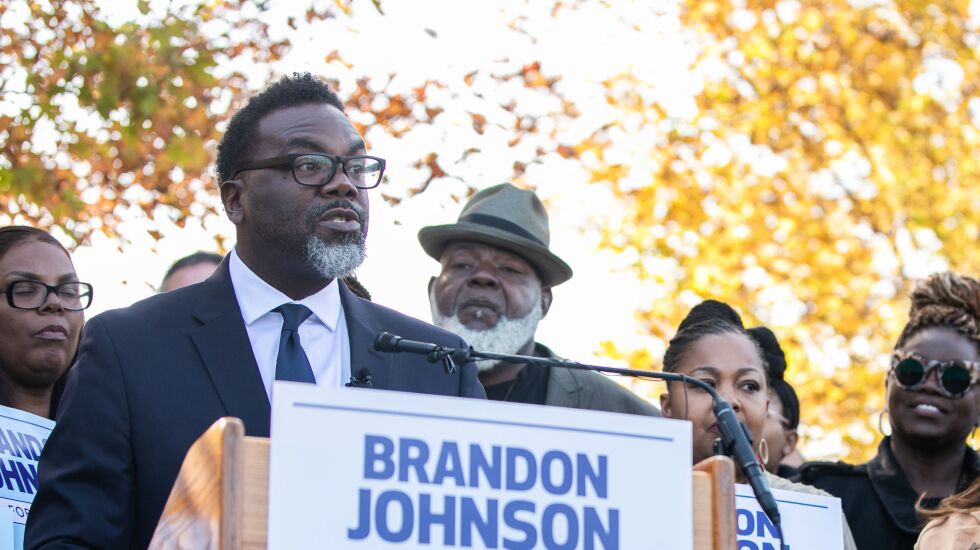
Cook County Commissioner Brandon Johnson has argued repeatedly that the Chicago Police Department’s $1.94 billion budget is “bigger than it’s ever been, and we’re still not safe.”
He said he firmly believes the “safest cities in America” have one thing in common: They “invest in people.”
With those tenets in mind, Johnson on Monday became the last of the nine mayoral candidates to unveil a plan to confront the issue foremost on the minds of voters: violent crime.
It’s clear now what took him so long: Johnson’s soup-to-nuts plan runs the gamut.
It starts at the police department — by “training and promoting” 200 new detectives, launching a “comprehensive efficiency audit” to identify savings that start with streamlining the number of “non-sergeant” police supervisors, closing CPD’s Homan Square facility, erasing the “racist” gang database and ending the three-year, $33 million ShotSpotter contract.
Chicago’s inspector general has found ShotSpotter rarely leads to investigatory stops or evidence of gun crimes and can change the way officers interact with neighborhoods they’re charged with patrolling.
Sweeping changes Johnson envisions also include terminating officers affiliated with the Proud Boys, Oathkeepers and other hate groups; enacting the stalled Anjanette Young Ordinance, which goes far beyond the police raid reforms imposed by Mayor Lori Lightfoot; publishing demographic information on arrests and traffic stops; and passing the so-called “Treatment — not Trauma” ordinance calling for “nonpolice personnel” to respond to mental health emergencies.
Johnson also said he wants to reopen 14 mental health centers.
He vowed to “immediately enact” the federal consent decree mandating police reform measures. Lightfoot has struggled to implement that decree. She branded the original deadline “unrealistic,” then asked for and received three more years to put in place those police reforms, which she claims will cost the city at least $50 million.
By raising the real estate transfer tax on high-end home sales, Johnson wants to create a dedicated source of funding for what he calls “Chicago’s 51st Ward” — the city’s 65,000 unhoused residents, a group he said includes 20,000 Chicago Public School students and their families. That money also would be used to double — to 65,000 — the number of summer jobs for young people.
An organizer for the Chicago Teachers Union, which is helping to bankroll his candidacy, Johnson is promising to empower young people by enacting the “Peacebook” restorative justice ordinance; build a “comprehensive trauma network” at public schools most impacted by violence to provide social services” to student crime victims and their families and build a “career and technical education corridor” at schools including Fenger, Chicago Vocational, Phillips, Tilden and Dunbar to provide “specialized training” in growth industries.
To reduce violent crime on the CTA and bring back riders, Johnson said he wants to launch a Violence Intervention Program to connect riders with housing, mental health and support services in partnership with the Night Ministry and other community organizations.
Even as he audits CPD spending, Johnson wants to expand the city and CPD bureaucracies with a new Mayor’s Office of Community Safety; a new Gun Trafficker Department and launch a missing persons initiative at CPD. He also would fully fund the Office of Domestic Violence and domestic violence intervention services, establish trauma recovery centers and create a “priority public housing list” for survivors of domestic abuse.
Ever since the civil unrest followed by looting in Chicago after the murder of George Floyd in 2020, Johnson has been an unabashed supporter of diverting police funds to “people programs.”
On Monday, he steered conspicuously clear of a politically volatile term.
“I did not say ‘defund’’ Those are not my words. This is about efficiencies and doing what works,” Johnson said.
Under repeated questioning by the Chicago Sun-Times, Johnson refused to say whether he would permanently eliminate the 1,600 police vacancies.
“I’m gonna invest in people. That’s my answer. ... I’m gonna invest in people because that’s what safe American cities do,” he said.
Johnson said he believes he can cut up to $150 million out of PD’s $1.94 billion simply by streamlining the “supervisor-to-rank-and-file ratio,” which he called “out of whack.”
He has accused mayoral challenger Jesus “Chuy” Garcia, with whom he is competing for the progressive vote, of “abandoning the progressive movement” by “copying and pasting” Lightfoot’s “failed” crime-fighting plan.
He took the wraps off his own anti-crime plan only after unveiling a tax-the-rich plan to bankroll $1 billion in new spending on public schools, transportation, new housing, health care and job creation.
“For too long, we’ve had politicians who have lied to us and political insiders that have kicked the can down the road. It’s what has caused us to have the type of economic despair that we are experiencing right now. ... The difference between my plan and everyone’s plan is that my plan calls for investments in people,” he said.







